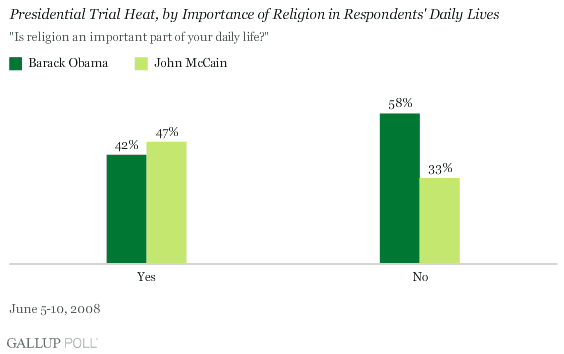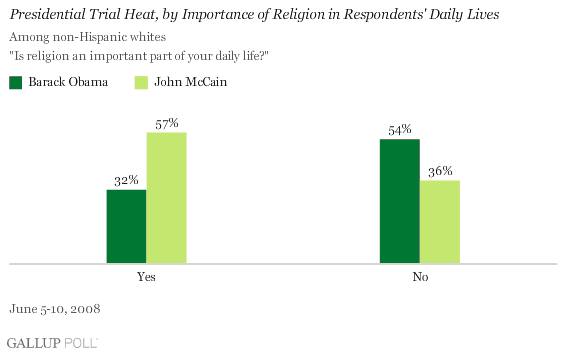PRINCETON, NJ -- John McCain beats Barack Obama in a general-election trial heat by a 47% to 42% margin among voters who say religion is an important part of their daily lives, while Obama wins by an overwhelming 58% to 33% margin among voters who say religion is not an important part of their lives.

This analysis is based on a sample of more than 5,000 registered voters interviewed between June 5 and June 10, all interviews completed since Obama's status as the Democratic nominee became a near certainty after the final Democratic primaries. The data show that Americans' self-reports of the importance of religion in their lives are powerfully predictive of voting preferences in the coming general election.
Thirty-five percent of Americans at this time say religion is not an important part of their daily lives. Among this group, support for Obama's candidacy is 10 points higher than for the sample as a whole (Obama leads McCain overall by a 48% to 42% margin during this period), and support for McCain is nine points lower. This results in a swing from a six-point overall lead for Obama among all voters to a lead of 25 points among less religious voters. Among the group of Americans for whom religion is important -- 64% of the sample -- the swing is from the Obama six-point lead to a McCain lead of five points.
This relationship, powerful as it is, is mitigated by the fact that the black Americans included in the sample are both highly religious and highly likely to support Obama. It therefore follows that the relationship between self-reported importance of religion and general-election vote is stronger when the sample is restricted only to whites.
McCain wins overall among non-Hispanic whites by a 49% to 40% margin, a common pattern for Republican candidates in recent presidential races. But among whites, as is true for the overall sample, religion remains a very strong dividing variable.

Among white voters for whom religion is an important part of daily lives, McCain's margin stretches to a very large 25 points, 57% to 32%. Among white voters for whom religion is not an important part of their daily lives, about 37% of all white voters, Obama wins by an 18-point margin, 54% to 36%. This is a shift in the margin of an extraordinary 43 points between whites who are religious and those who are not. In short, this one dichotomous question about the importance of religion is by itself a potent predictor of white voters' presidential vote intentions.
The reasons for this relationship are complex. Self-reported importance of religion is itself highly related to a number of other demographic variables, which in turn are related to political orientation. Younger voters, for example, are less likely than those who are older to say religion is important in their lives, and younger voters are among Obama's largest support groups. Unmarried voters are less likely to say religion is important in their lives and more likely to support Obama. Highly educated voters are less likely to say religion is important in their lives (although they attend church with equal frequency to those with less education) and highly educated voters constitute a strong voter bloc for Obama.
At the same time, importance of religion is related to a number of social and values attitudes that are themselves related to political orientation.
Thus, it is difficult to pinpoint exactly what is driving the religion-vote relationship. It may be that religion per se is less important than some underlying causal factor -- either demographic or attitudinal -- that is correlated with both religion and voting propensity. Still, the fact remains that at the overarching level, a simple answer to a question about the importance of religion in a person's life is a strongly suggestive clue as to how that person will vote in the November general election.
Survey Methods
Results are based on telephone interviews with 5,299 registered voters, aged 18 and older, conducted June 5-10, 2008. For results based on the total sample of national adults, one can say with 95% confidence that the maximum margin of sampling error is ±2 percentage points.
Interviews are conducted with respondents on land-line telephones (for respondents with a land-line telephone) and cellular phones (for respondents who are cell-phone only).
In addition to sampling error, question wording and practical difficulties in conducting surveys can introduce error or bias into the findings of public opinion polls.
To provide feedback or suggestions about how to improve Gallup.com, please e-mail feedback@gallup.com.
